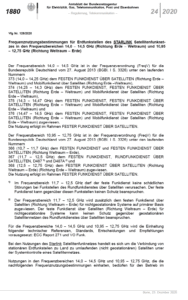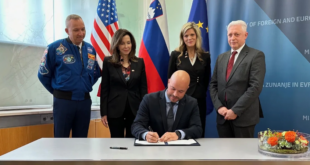
Paris, 24 December 2020. – While Europe mulls its own LEO, SpaceX taps the German market.
The German federal telecommnunications agency Bundesnetzagentur authorized Starlink to use up- and downlink frequencies in Germany and offer satellite broadband internet, the agency said. “This is the first frequency allocation for a so-called satellite mega-constellation with a very high number of low earth orbit satellites”, the agency said.
“(D)ue to the novelty of this satellite constellation”, the frequency allocation is for now limited to a year. Details of the Starlink constellation were published by the agency yesterday.
While SpaceX enters, a consortium of European space companies including Airbus, Eutelsat, OHB and Thales has been selected by the European Commission to consider “a European-owned space-based communication system”.
„Complementing Copernicus and Galileo, this new EU flagship programme, once given the green light, would fully exploit the synergies of the technological potential akin to the Digital and Space industries. The contract value of the year-long feasibility study amounts to € 7.1 million,“ the consortium said yesterday.
„The study will assess the feasibility of a new initiative aiming to strengthen European digital sovereignty and provide secure connectivity for citizens, commercial enterprises and public institutions as well as providing global coverage for rural and ‘not-spot’ areas,” the consortium said.
The European Commissioner for Internal Market, Thierry Breton, announced in early December that he started to work on a European Low Earth Orbit satellite constellation.
SpaceX has already operates around 900 Starlink satellites in LEO and has launched its “Better Than Nothing” beta test program across the United States. SpaceX recently received $855 million from the U.S. in federal rural broadband subsidies.
At the same time, OneWeb, which was rescued from bankruptcy by the British Government and the Indian Bharti Group, went back into operational mode and launched another three dozen satellites last week, bringing the total of satellites to 110.





